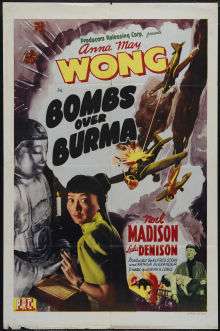Bombs Over Burma
Bombs Over Burma (also known as The Devil's Sister), based on a story by Milton Raison, is a 1942 American war film directed by Joseph H. Lewis.[2] To depict the Chinese character faithfully, the star, Anna May Wong, and other characters speak Mandarin in the first few minutes of the film.[3]
| Bombs Over Burma | |
|---|---|
 Theatrical release poster | |
| Directed by | Joseph H. Lewis[1] |
| Produced by | Arthur Alexander Alfred Stern |
| Written by | Joseph H. Lewis George Wellington Pardy Milton Raison (story) |
| Starring | Anna May Wong |
| Music by | Lee Zahler |
| Cinematography | Robert E. Cline |
| Edited by | Charles Henkel Jr. |
| Distributed by | Producers Releasing Corporation |
Release date |
|
Running time | 65 minutes |
| Country | United States |
| Language | English |
Plot
In 1942, Chinese guerrillas fighting for the Allied cause in Burma during World War II are helping to build a road. During the construction of a military supply road like the Burma Road and Ledo Road, the project is sabotaged by an English nobleman who is a German agent.
Using a scientific device, the English nobleman is instrumental in the coordination of a Japanese air attack on supply trucks attempting to cross a key bridge. A Chinese school teacher (Anna May Wong) reveals the schemes of the traitor, and brings about his destruction at the hands of Chinese peasants armed with picks and shovels.
Cast
As appearing in Bombs Over Burma, (main roles and screen credits identified):[4]
- Anna May Wong as Lin Ying
- Noel Madison as Me-Hoi
- Leslie Denison as Sir Roger Howe
- Nedrick Young as Slim Jenkins
- Dan Seymour as Pete Brogranza
- Frank Lackteen as Hallam
- Teala Loring as Lucy Dell
- Dennis Moore as Tom Whitley
- Connie Leon as Ma Sing
- Hayward Soo Hoo as Ling
- Richard Loo as Col. Kim
- Paul Fung as Toy Vendor
- Richard Wong as Servant
Production
Lack of an adequate budget and a two-week shooting schedule hampered the production, limiting Bombs Over Burma to "B-fare".[5][6]
Reception
Production values doomed Bombs Over Burma both at the box office and with critics. The review in The New York Times succinctly called it a "dud", loaded with stock shots, even recognizable "California architecture."[7] Later reviews such as that of Leonard Maltin, noted that the film was an "... interesting if failed attempt to make a hard-hitting, topical film ... Director/cowriter Lewis' visual flair can't save a talky, pedestrian script. Wong comes off well, as usual."[8]
Availability
Alpha Video released the film on region-1 DVD on June 28, 2005.[9]
References
- Notes
- Bombs Over Burma (1942) on IMDb
- Evans 2000, p. 30.
- Leong 2005, p. 191.
- "Credits: Bombs Over Burma (1942)." Turner Classic Movies. Retrieved: May 7, 2012.
- Leong 2005, p. 101.
- Erickson, Hal. "Bombs Over Burma." Archived April 26, 2006, at the Wayback Machine Allmovie. Retrieved: March 22, 2012.
- T.S. "Movie Review: Bombs Over Burma (1942)." The New York Times, August 10, 1942.
- "Leonard Maltin Film Review: Bombs Over Burma (1942)." Turner Classic Movies. Retrieved: May 7, 2012.
- "Bombs Over Burma." oldies.com. Retrieved: March 22, 2012.
- Bibliography
- Evans, Alun. Brassey's Guide to War Films. Dulles, Virginia: Potomac Books, 2000. ISBN 1-57488-263-5.
- Leong, Karen J. The China Mystique: Pearl S. Buck, Anna May Wong, Mayling Soong, and the Transformation of American Orientalism. Berkeley, California: University of California Press, 2005. ISBN 0-5202-4422-2.
- Taves, Brian. Joseph H. Lewis, Anna May Wong, and Bombs Over Burma. In Gary Rhodes, ed. The Films of Joseph H. Lewis. Detroit, Michigan: Wayne State University Press, 2012. ISBN 978-0814334621.
External links
- Bombs Over Burma on IMDb
- Bombs Over Burma at the TCM Movie Database
- Bombs Over Burma at AllMovie
- Bombs Over Burma is available for free download at the Internet Archive
- Bombs Over Burma on YouTube